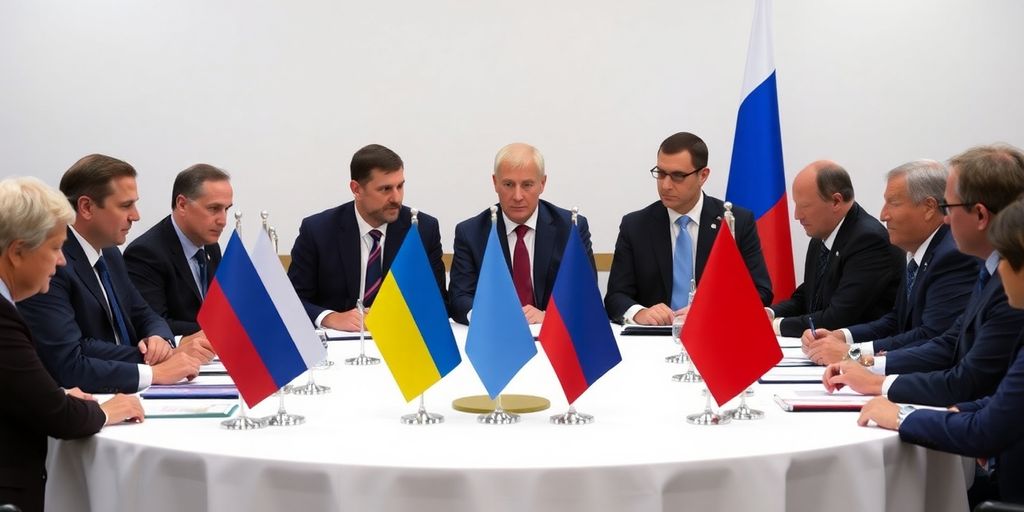In a significant diplomatic effort, Turkey is set to host trilateral peace talks involving Ukraine and Russia on May 16, 2025. This meeting marks the first direct negotiations between the two nations since the failed talks in Istanbul in 2022. However, the absence of key leaders raises doubts about the potential for meaningful progress.
Key Takeaways
- Trilateral Talks: Ukraine, Russia, and Turkey are engaging in peace discussions in Istanbul.
- Delegation Dynamics: Ukrainian President Volodymyr Zelensky will not attend unless Russian President Vladimir Putin is present.
- Low Expectations: U.S. officials express skepticism about the talks leading to a breakthrough.
- Ceasefire Proposal: Ukraine is advocating for an unconditional 30-day ceasefire as a starting point for negotiations.
Background of the Talks
The upcoming talks were initiated after Russian President Vladimir Putin proposed a meeting in Turkey, which was accepted by Zelensky. However, Putin declined to attend personally, sending a lower-level delegation instead, which has been criticized by Ukrainian officials as a sign of insincerity.
Zelensky’s decision to send a smaller delegation led by Defense Minister Rustem Umerov reflects Ukraine’s strategy to focus on ceasefire discussions. The Ukrainian team includes high-ranking officials from military and intelligence sectors, emphasizing the seriousness of their approach to the negotiations.
The Russian Delegation
The Russian delegation, headed by Vladimir Medinsky, includes several key figures:
- Mikhail Galuzin: Deputy Foreign Minister
- Igor Kostyukov: Military Intelligence Director
- Alexander Fomin: Deputy Defense Minister
Notably absent from the Russian team are prominent figures such as Foreign Minister Sergey Lavrov and Putin’s foreign policy aide, Yuri Ushakov, which has led to speculation about the seriousness of Russia’s commitment to the talks.
U.S. Involvement and Expectations
U.S. Secretary of State Marco Rubio is expected to meet with Ukrainian officials in Istanbul, while other U.S. representatives will engage with the Russian delegation. Rubio has indicated that the level of the Russian delegation does not suggest a significant breakthrough is likely.
President Donald Trump has hinted at the possibility of attending the talks if progress is made, but he has also downplayed expectations, stating that no substantial movement can occur without a direct meeting with Putin.
Challenges Ahead
The atmosphere surrounding the talks is fraught with skepticism. Observers have noted that the lack of high-level participation from both sides, particularly the absence of Zelensky and Putin, diminishes the likelihood of a successful outcome. Zelensky has expressed frustration over the perceived disrespect from Russia, stating that the current delegation does not reflect a serious commitment to peace.
Ukraine’s call for an unconditional ceasefire has been met with resistance from Russia, which insists that discussions about a ceasefire must occur alongside negotiations on other issues. This fundamental disagreement highlights the challenges that lie ahead in the peace process.
Conclusion
As Turkey prepares to facilitate these crucial talks, the international community watches closely. The outcome of these discussions could have significant implications for the ongoing conflict in Ukraine and the broader geopolitical landscape. However, with low expectations and high tensions, the path to peace remains uncertain.
Sources
- Ukraine, Russia, Turkey to hold trilateral peace talks after midday, media reports, The Kyiv Independent.
- Peace breakthrough unlikely as Putin declines to meet Zelenskiy in Turkey, Reuters.
- Russian delegation to meet Ukrainian officials in Turkey, but unclear if Putin will attend, ABC News.
- Zelensky insists he will only join Ukraine-Russia talks in Turkey this week if Putin is present, CNN.






